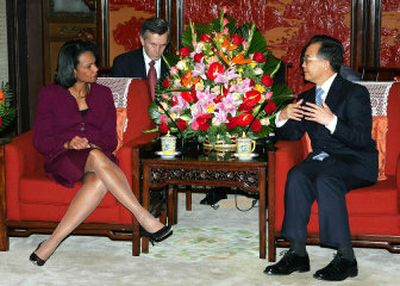Rice says China sent N. Korea ‘strong message’

BEIJING – China and the United States on Friday appeared to close ranks on North Korea, as Secretary of State Condoleezza Rice emerged from a daylong series of meetings here to say that a high-level Chinese government delegation had given North Korea “a strong message” about its nuclear test.
China urged North Korea, its longtime beneficiary, to return to six-nation negotiations and appeared ready to implement key measures of the U.N. Security Council resolution punishing the Pyongyang government, Rice said.
Chinese Foreign Minister Li Zhaoxing and other Chinese officials did not provide details of the meeting on Thursday between a Chinese envoy and North Korean leader Kim Jong Il. But Li pointedly told reporters after meeting with Rice that China will “continue to implement our relevant international obligations and exert our due role in this process.”
Rice, briefing reporters traveling with her, said China is considering a range of responses, but said she did not press the government to take any particular steps to force North Korea back to the bargaining table to discuss its nuclear program. “Let’s just watch and see what China will do,” Rice said, adding that “nobody wants to be on the wrong side of this resolution, in other words, something slipping through.”
The U.N. resolution bars trade with North Korea in major weapons, materials that could be used in a nuclear program and luxury goods. China has an 880-mile land border with North Korea, and Rice said the border would be closely monitored.
China has been North Korea’s largest trading partner, and has frequently criticized the Bush administration for its refusal to hold bilateral negotiations with North Korea. But officials here were shocked by Pyongyang’s refusal to heed its warnings not to conduct a test.
Rice arrived in China after stops in Japan and South Korea to coordinate strategy on implementing the resolution and to reassure Asians that the United States does not want to escalate the conflict. Among the leaders she met with were Chinese President Hu Jintao and Premier Wen Jiabao.
Rice said it was clear that early reports on U.S. intentions have “conjured up in people’s minds the Cuban missile crisis,” in which the United States imposed a quarantine on Cuba, and she wanted to allay those fears.
She also emphasized that she had not come to Asia “with my own list of what every country in the world should do.” But she predicted that the sanctions may remain in place for some time. “I do believe that you’re getting a firm response,” she said. “If there isn’t some movement, you may get a firmer response as time goes on, but I think this is going to evolve.”
On Thursday, China announced that State Councilor Tang Jiaxuan had met with Kim in Pyongyang. When Rice and Tang posed for photographs before their meeting Friday, Tang was overheard telling Rice, “Fortunately, my visit this time has not been in vain.” Reporters were then ushered from the room.
The Tang-Kim meeting spurred a rash of news reports in South Korea that Kim had expressed regret for the Oct. 9 test, that North Korea would return to the talks and even that North Korea had declared it would not conduct a second test. Like the Chinese officials, Rice did not disclose details of the meeting, except to say she did not get any indication that Kim expressed regret for testing the weapon.
“There wasn’t anything particularly surprising” about Kim’s message, Rice said, suggesting the reports that Kim promised a halt in testing were also inaccurate.
Rice aides declined to elaborate on her remarks. In Washington, White House spokesman Tony Snow said that “the North Koreans have not made proffers to return to the six-party talks” and instead said they would return only if the United States ended a crackdown on North Korean money-laundering operations.